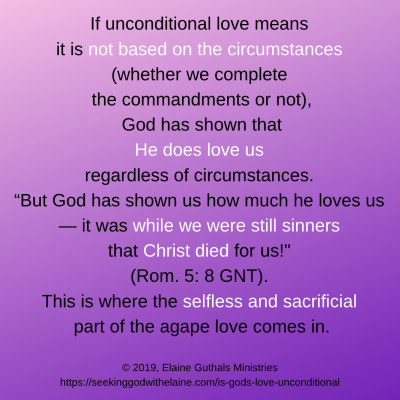How would you answer if someone told you God’s love was not unconditional? Does His establishment of commandments show He does not love us? This devotion, the first in the God’s Unconditional Love series, looks at whether God doesn’t love us because He has established commandments and punishes us for breaking them.
Nuggets
- God’s love and love for God is agape love.
- God established commandments because of His love for us and to help us live orderly lives.
- God punished us when we break the commandments because of His love for us.
Devotions in the God’s Unconditional Love series

When I am writing these devotions, depending on the topic, I do a lot of research. A lot of times, I will read something that flips something in my mind that really doesn’t pertain to the topic at hand. I’m interested in it for a future devotion, so I’ll throw the concept on a template and stick it in a drafts folder.
This is one of them. I was researching God’s love. I read somebody’s response to the question of whether God’s love is unconditional. The person’s response was no.
That response and their reasoning made me very sad because it is not true. Let’s break it down and see what is true. First, though, let’s look what love is.
What Is Love?
But if his descendants forsake my instructions and fail to obey my regulations, if they do not obey my decrees and fail to keep my commands, then I will punish their sin with the rod, and their disobedience with beating. But I will never stop loving him nor fail to keep my promise to him. (Ps. 89: 30-33 NLT)
These days we love everything from our significant other to our dog. But we also say we love everything from our music to the outfit we are wearing.
So, if we’ve are not limiting love to just our relationships with people, what does love really mean? Let’s look at some definitions.
Love is an intense feeling of deep affection. It drives you toward something. Affection is fondness and liking.
But we aren’t talking about any kind of love. We’re talking unconditional love.
Unconditional love is intense feelings of deep affection without limits or circumstances. It is believed to be a complete love.
So, unconditional love is you have strong feelings no matter what.
But we also need to look at agape love. That is the love that originates from God for man. However, it is reciprocal. It isn’t brotherly love or romantic love that we humans share with each other.
Agape love not only is unconditional, but it is also selfless and sacrificial. It is God’s covenant love.
God Loves Us
There are many verses in the Bible that tell us of God’s love for us. Here are just a couple.
- “We know how much God loves us, and we have put our trust in his love. God is love, and all who live in love live in God, and God lives in them” (I Jn. 4: 16 NLT).
- “For God so loved the world, that he gave his only begotten Son, that whosoever believeth in him should not perish, but have everlasting life” (Jn. 3: 16 KJV).
- “’I have loved you,’ says the LORD. …” (Mal. 1: 2 ESV).
- “Because you are precious in my eyes, and honored, and I love you, I give men in return for you, peoples in exchange for your life” (Isa. 43: 4 ESV). This verse talks of deliverance for God’s people. God is not only talking about deliverance from Babylon, but also deliverance from sin by Jesus.
- “Long ago the LORD said to Israel: ‘I have loved you, my people, with an everlasting love. With unfailing love I have drawn you to myself’” (Jer. 31: 3 ESV).
Now let’s look at the arguments given as to why God doesn’t love us unconditionally.
God Doesn’t Love You Because He Makes You Follow Commandments
People today think love means not setting boundaries. They think love condones whatever actions they do. This is a very selfish definition of love. If it were applied to relationships, it strips the other person of their feelings, values, and choices.
We will have rules to follow our whole life. We start out obeying our parents’ rules. Then there are school rules. There are always laws of the land to follow (stop signs, stop lights, speed limits have minor consequences; murder and stealing have major consequences). We grow up and get jobs — and have to follow our employers’ rules. Do I need to go on?
The establishment of rules show us how far we can go in something. It builds consensus. It shows what is acceptable and what isn’t.
Rules are usually made because we are trying to better circumstances, not punish people. Especially in the case of parents, rules are made out of love in order to help children grow up to be their best.
But as I said, people today balk against rules and boundaries. They don’t want others to tell them what to do — especially God.
Sovereign God does have the authority to place commandments on us. As He is our Creator, we should follow His commandments. We are His subjects, not His equal. We should follow His Will.
Really, telling anything different is Satan inciting people to rebel against God. He is stirring up people to turn away from the One true God.
If God set His commandments in order for us to grow to be our best, rebelling against these commandments would mean we are not going to be the best we could be. Yet Satan is deluding people to think the opposite.

God Doesn’t Love You If He Punishes You
To me, thinking God doesn’t love you if He punishes you is an offshoot of the no commandments one. If you don’t have rules, you won’t deserve punishment because nothing is wrong.
But we do have rules in society. People who break those rules should be punished. When people aren’t — or some are, some aren’t — that creates problems. Just ignoring the rules doesn’t solve anything. Selective enforcement doesn’t solve anything.
We correct people when they are heading in a wrong way. Parents correct kids. Teachers correct students. Sometimes that correction involves punishment.
We do this because we love the person. We want them to be able to function well in society.
God is the same way. “My child, don’t reject the Lord’s discipline, and don’t be upset when he corrects you. For the Lord corrects those he loves, just as a father corrects a child in whom he delights” (Prov. 3: 11-12 NLT).
God punishes us when we break His commandments. Those are his commandments. He gets to choose the punishment.
Let’s just stop and think about this a minute. If there were no punishment, was no right or wrong, there would be no grace and mercy.
What is grace? Even though we don’t deserve good things, God gives them to us anyway.
What is mercy? Even though we deserve bad things, God doesn’t give them to us.
If you are doing what is right, there is no need for mercy. If there is no wrong, there is no need for grace.

If you are doing what is right, there is no need for mercy. If there is no wrong, there is no need for mercy.
Think of it this way. We don’t generally grow the most when we do things right. We grow more by our mistakes and failures. In an anything-goes world, we wouldn’t grow as much.

Making the Connections
God established commandments so that we would have orderly lives. He made these because He does love us.
Thinking that we should not have boundaries set on us is not showing love to the other, in this case God.
Does “limitless” mean the depth of the love rather than whether or not conditions are out on it? I think so.
If unconditional love means it is not based on the circumstances (whether we complete the commandments or not), God has shown that He does love us regardless of circumstances. “But God has shown us how much he loves us — it was while we were still sinners that Christ died for us!” (Rom. 5: 8 GNT). This is where the selfless and sacrificial part of the agape love comes in.

If God put conditions on saving us, wouldn’t He make us clean up our acts first? He doesn’t. We come to Him just as we are. We clean up our acts after we become believers. We do this by following His commandments.
To read Do We Have to Clean Uo Our Acts to Get Salvation?, click the button below.
The worldview would like to strip God of His ability to enforce the commandments. It would like to undermine His authority and power. It does this by questioning His love. However, from cover to cover, the Bible does show us the depth of His unconditional love.
How Do We Apply This?
We need to totally understand God’s love. In order to do that, we have to search for and seek Him.
Searching for and Seeking God
Hearing His Word (Rom. 10: 17).
Reading His Word (Rev. 1: 3).
Praying to Him (Heb. 4: 16).
Studying His Word (Ac. 17: 11).
Meditating on His Word (Ps. 1: 1-2).
Memorizing His Word (Ps. 119: 11).
We can’t totally understand Him until we are in communication with Him. If we don’t seek Him in His Word, we will never understand Him.
Tomorrow we will be discussing whether God loves non-believers.
Loving Heavenly Father. You do love us unconditionally. You love us so much that You show us the way we should live. You have established commandments to guide us as to how You want us to live. These commandments are in our best interests. We pray that You will help us to grow more in Your image. We long for the day when we see You face to face. Amen.
If you have not admitted that your relationship is not right with God,
have not asked Jesus to be your Lord and Savior,
and have not confessed your sins,
please read through the Plan of Salvation and prayerfully consider what God is asking you to do.
What do you think? Does placing boundaries means a person does not love unconditionally? What is the purpose of commandments?
Leave me a comment below (about this or anything else) or head over to my Facebook group for some interactive discussion.
If you don’t understand something and would like further clarification, please contact me.
If you have not signed up for the email daily or weekly providing the link to the devotions and the newsletter, do so below.
If God has used this devotion to speak with you, consider sharing it on social media.
Pingback: Does God Love Non-Believers? – Seeking God with Elaine
Pingback: What Does Justification Mean? – Seeking God with Elaine
Pingback: How Do We Love God? – Seeking God with Elaine
Pingback: Who Is God? – Seeking God with Elaine
Pingback: Focus on Love, Not Evil – Seeking God with Elaine